Motivation Theories in Modern Business: A Tesco Workplace Analysis
VerifiedAdded on 2023/06/10
|8
|1879
|438
Essay
AI Summary
This essay explores the concept of motivation and various motivation theories, examining how modern businesses, particularly Tesco, implement these theories in the workplace. It discusses Maslow's hierarchy of needs and its application within Tesco, highlighting how the company addresses physiological, safety, love and belongingness, esteem, and self-actualization needs of its employees. The essay emphasizes the importance of both monetary and non-monetary motivational factors, the role of managers in identifying and addressing employee needs, and the impact of motivation on productivity, employee engagement, and overall organizational success. It concludes that by effectively applying motivation theories, companies can foster a positive work environment, improve performance, and achieve their goals.

Individual Essay
Paraphrase This Document
Need a fresh take? Get an instant paraphrase of this document with our AI Paraphraser
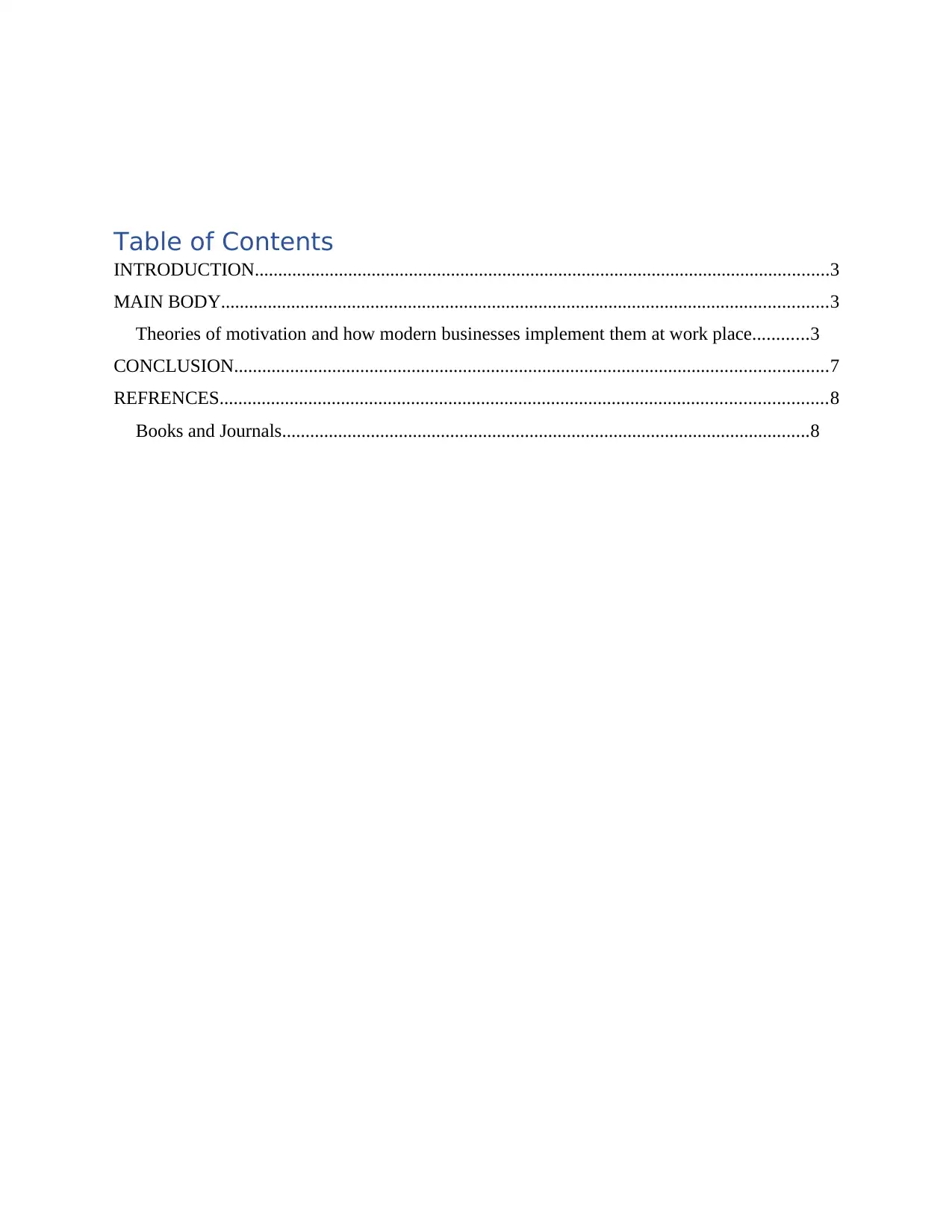
Table of Contents
INTRODUCTION...........................................................................................................................3
MAIN BODY..................................................................................................................................3
Theories of motivation and how modern businesses implement them at work place............3
CONCLUSION...............................................................................................................................7
REFRENCES..................................................................................................................................8
Books and Journals.................................................................................................................8
INTRODUCTION...........................................................................................................................3
MAIN BODY..................................................................................................................................3
Theories of motivation and how modern businesses implement them at work place............3
CONCLUSION...............................................................................................................................7
REFRENCES..................................................................................................................................8
Books and Journals.................................................................................................................8
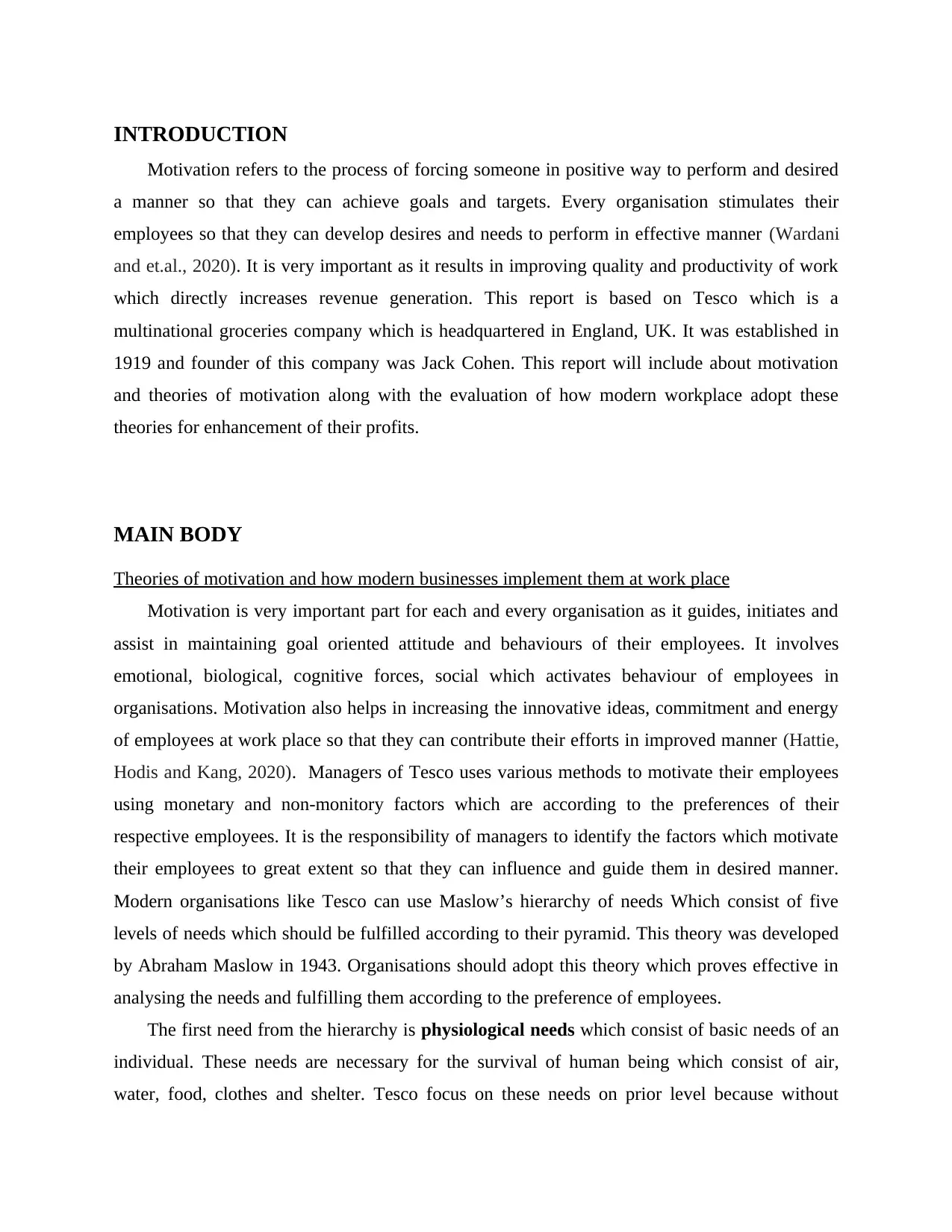
INTRODUCTION
Motivation refers to the process of forcing someone in positive way to perform and desired
a manner so that they can achieve goals and targets. Every organisation stimulates their
employees so that they can develop desires and needs to perform in effective manner (Wardani
and et.al., 2020). It is very important as it results in improving quality and productivity of work
which directly increases revenue generation. This report is based on Tesco which is a
multinational groceries company which is headquartered in England, UK. It was established in
1919 and founder of this company was Jack Cohen. This report will include about motivation
and theories of motivation along with the evaluation of how modern workplace adopt these
theories for enhancement of their profits.
MAIN BODY
Theories of motivation and how modern businesses implement them at work place
Motivation is very important part for each and every organisation as it guides, initiates and
assist in maintaining goal oriented attitude and behaviours of their employees. It involves
emotional, biological, cognitive forces, social which activates behaviour of employees in
organisations. Motivation also helps in increasing the innovative ideas, commitment and energy
of employees at work place so that they can contribute their efforts in improved manner (Hattie,
Hodis and Kang, 2020). Managers of Tesco uses various methods to motivate their employees
using monetary and non-monitory factors which are according to the preferences of their
respective employees. It is the responsibility of managers to identify the factors which motivate
their employees to great extent so that they can influence and guide them in desired manner.
Modern organisations like Tesco can use Maslow’s hierarchy of needs Which consist of five
levels of needs which should be fulfilled according to their pyramid. This theory was developed
by Abraham Maslow in 1943. Organisations should adopt this theory which proves effective in
analysing the needs and fulfilling them according to the preference of employees.
The first need from the hierarchy is physiological needs which consist of basic needs of an
individual. These needs are necessary for the survival of human being which consist of air,
water, food, clothes and shelter. Tesco focus on these needs on prior level because without
Motivation refers to the process of forcing someone in positive way to perform and desired
a manner so that they can achieve goals and targets. Every organisation stimulates their
employees so that they can develop desires and needs to perform in effective manner (Wardani
and et.al., 2020). It is very important as it results in improving quality and productivity of work
which directly increases revenue generation. This report is based on Tesco which is a
multinational groceries company which is headquartered in England, UK. It was established in
1919 and founder of this company was Jack Cohen. This report will include about motivation
and theories of motivation along with the evaluation of how modern workplace adopt these
theories for enhancement of their profits.
MAIN BODY
Theories of motivation and how modern businesses implement them at work place
Motivation is very important part for each and every organisation as it guides, initiates and
assist in maintaining goal oriented attitude and behaviours of their employees. It involves
emotional, biological, cognitive forces, social which activates behaviour of employees in
organisations. Motivation also helps in increasing the innovative ideas, commitment and energy
of employees at work place so that they can contribute their efforts in improved manner (Hattie,
Hodis and Kang, 2020). Managers of Tesco uses various methods to motivate their employees
using monetary and non-monitory factors which are according to the preferences of their
respective employees. It is the responsibility of managers to identify the factors which motivate
their employees to great extent so that they can influence and guide them in desired manner.
Modern organisations like Tesco can use Maslow’s hierarchy of needs Which consist of five
levels of needs which should be fulfilled according to their pyramid. This theory was developed
by Abraham Maslow in 1943. Organisations should adopt this theory which proves effective in
analysing the needs and fulfilling them according to the preference of employees.
The first need from the hierarchy is physiological needs which consist of basic needs of an
individual. These needs are necessary for the survival of human being which consist of air,
water, food, clothes and shelter. Tesco focus on these needs on prior level because without
⊘ This is a preview!⊘
Do you want full access?
Subscribe today to unlock all pages.

Trusted by 1+ million students worldwide
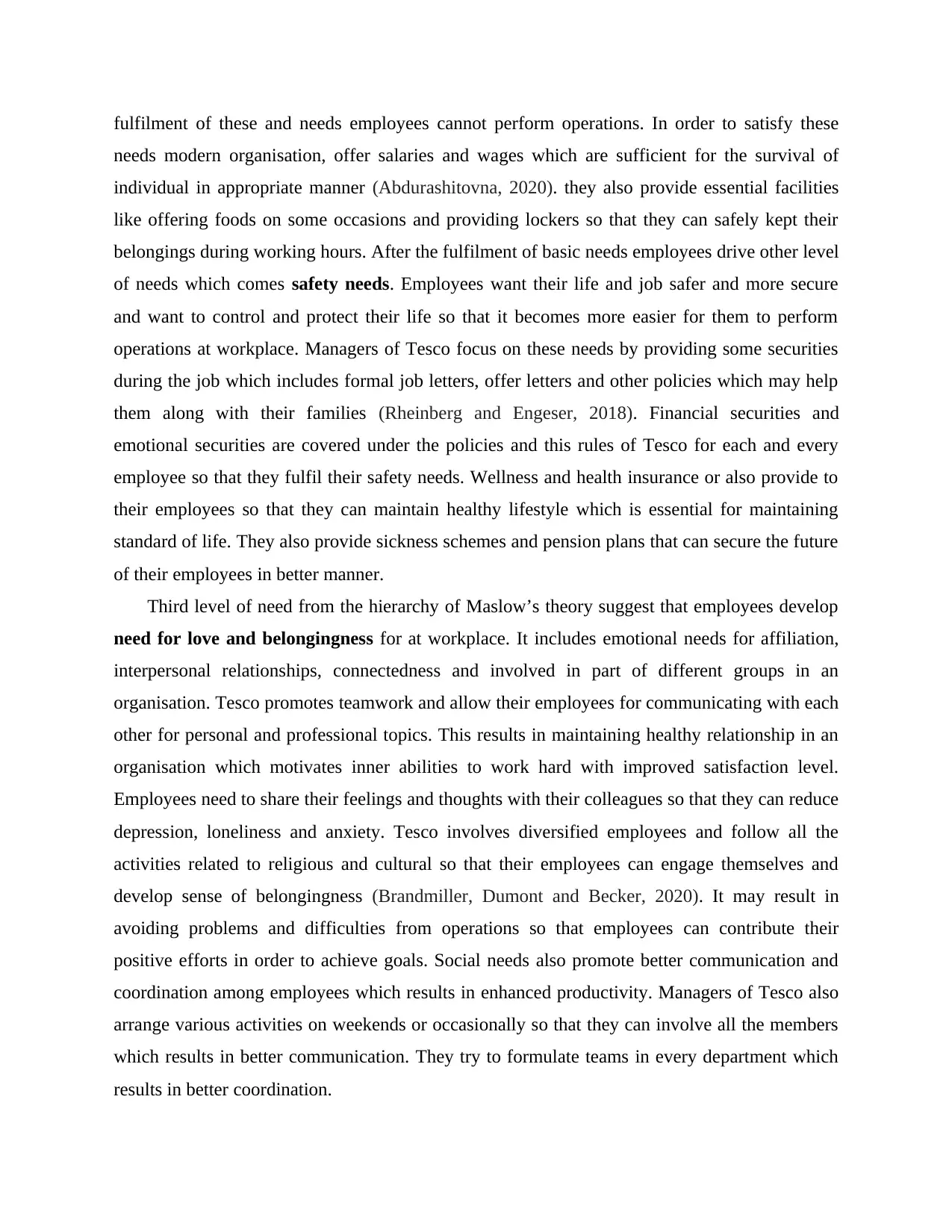
fulfilment of these and needs employees cannot perform operations. In order to satisfy these
needs modern organisation, offer salaries and wages which are sufficient for the survival of
individual in appropriate manner (Abdurashitovna, 2020). they also provide essential facilities
like offering foods on some occasions and providing lockers so that they can safely kept their
belongings during working hours. After the fulfilment of basic needs employees drive other level
of needs which comes safety needs. Employees want their life and job safer and more secure
and want to control and protect their life so that it becomes more easier for them to perform
operations at workplace. Managers of Tesco focus on these needs by providing some securities
during the job which includes formal job letters, offer letters and other policies which may help
them along with their families (Rheinberg and Engeser, 2018). Financial securities and
emotional securities are covered under the policies and this rules of Tesco for each and every
employee so that they fulfil their safety needs. Wellness and health insurance or also provide to
their employees so that they can maintain healthy lifestyle which is essential for maintaining
standard of life. They also provide sickness schemes and pension plans that can secure the future
of their employees in better manner.
Third level of need from the hierarchy of Maslow’s theory suggest that employees develop
need for love and belongingness for at workplace. It includes emotional needs for affiliation,
interpersonal relationships, connectedness and involved in part of different groups in an
organisation. Tesco promotes teamwork and allow their employees for communicating with each
other for personal and professional topics. This results in maintaining healthy relationship in an
organisation which motivates inner abilities to work hard with improved satisfaction level.
Employees need to share their feelings and thoughts with their colleagues so that they can reduce
depression, loneliness and anxiety. Tesco involves diversified employees and follow all the
activities related to religious and cultural so that their employees can engage themselves and
develop sense of belongingness (Brandmiller, Dumont and Becker, 2020). It may result in
avoiding problems and difficulties from operations so that employees can contribute their
positive efforts in order to achieve goals. Social needs also promote better communication and
coordination among employees which results in enhanced productivity. Managers of Tesco also
arrange various activities on weekends or occasionally so that they can involve all the members
which results in better communication. They try to formulate teams in every department which
results in better coordination.
needs modern organisation, offer salaries and wages which are sufficient for the survival of
individual in appropriate manner (Abdurashitovna, 2020). they also provide essential facilities
like offering foods on some occasions and providing lockers so that they can safely kept their
belongings during working hours. After the fulfilment of basic needs employees drive other level
of needs which comes safety needs. Employees want their life and job safer and more secure
and want to control and protect their life so that it becomes more easier for them to perform
operations at workplace. Managers of Tesco focus on these needs by providing some securities
during the job which includes formal job letters, offer letters and other policies which may help
them along with their families (Rheinberg and Engeser, 2018). Financial securities and
emotional securities are covered under the policies and this rules of Tesco for each and every
employee so that they fulfil their safety needs. Wellness and health insurance or also provide to
their employees so that they can maintain healthy lifestyle which is essential for maintaining
standard of life. They also provide sickness schemes and pension plans that can secure the future
of their employees in better manner.
Third level of need from the hierarchy of Maslow’s theory suggest that employees develop
need for love and belongingness for at workplace. It includes emotional needs for affiliation,
interpersonal relationships, connectedness and involved in part of different groups in an
organisation. Tesco promotes teamwork and allow their employees for communicating with each
other for personal and professional topics. This results in maintaining healthy relationship in an
organisation which motivates inner abilities to work hard with improved satisfaction level.
Employees need to share their feelings and thoughts with their colleagues so that they can reduce
depression, loneliness and anxiety. Tesco involves diversified employees and follow all the
activities related to religious and cultural so that their employees can engage themselves and
develop sense of belongingness (Brandmiller, Dumont and Becker, 2020). It may result in
avoiding problems and difficulties from operations so that employees can contribute their
positive efforts in order to achieve goals. Social needs also promote better communication and
coordination among employees which results in enhanced productivity. Managers of Tesco also
arrange various activities on weekends or occasionally so that they can involve all the members
which results in better communication. They try to formulate teams in every department which
results in better coordination.
Paraphrase This Document
Need a fresh take? Get an instant paraphrase of this document with our AI Paraphraser
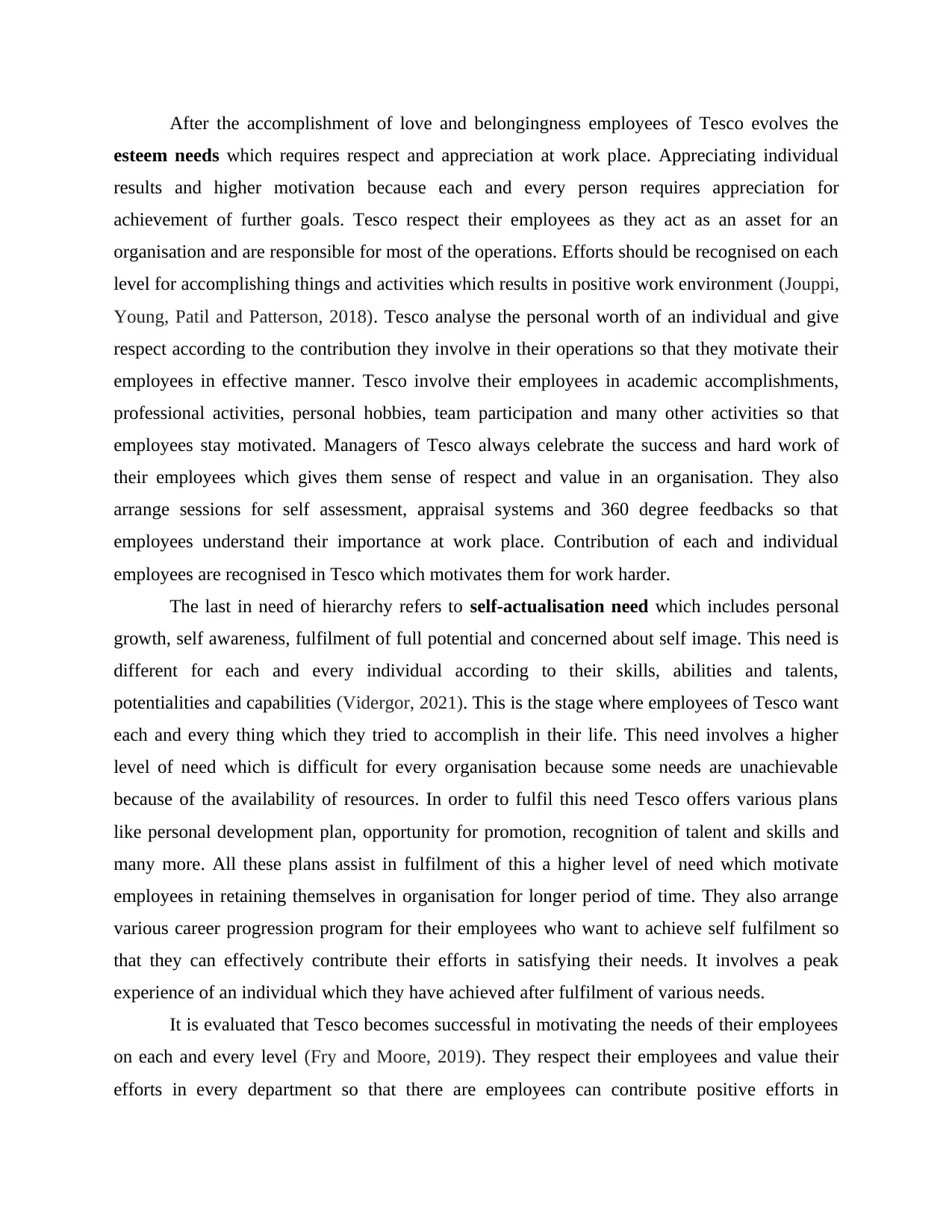
After the accomplishment of love and belongingness employees of Tesco evolves the
esteem needs which requires respect and appreciation at work place. Appreciating individual
results and higher motivation because each and every person requires appreciation for
achievement of further goals. Tesco respect their employees as they act as an asset for an
organisation and are responsible for most of the operations. Efforts should be recognised on each
level for accomplishing things and activities which results in positive work environment (Jouppi,
Young, Patil and Patterson, 2018). Tesco analyse the personal worth of an individual and give
respect according to the contribution they involve in their operations so that they motivate their
employees in effective manner. Tesco involve their employees in academic accomplishments,
professional activities, personal hobbies, team participation and many other activities so that
employees stay motivated. Managers of Tesco always celebrate the success and hard work of
their employees which gives them sense of respect and value in an organisation. They also
arrange sessions for self assessment, appraisal systems and 360 degree feedbacks so that
employees understand their importance at work place. Contribution of each and individual
employees are recognised in Tesco which motivates them for work harder.
The last in need of hierarchy refers to self-actualisation need which includes personal
growth, self awareness, fulfilment of full potential and concerned about self image. This need is
different for each and every individual according to their skills, abilities and talents,
potentialities and capabilities (Vidergor, 2021). This is the stage where employees of Tesco want
each and every thing which they tried to accomplish in their life. This need involves a higher
level of need which is difficult for every organisation because some needs are unachievable
because of the availability of resources. In order to fulfil this need Tesco offers various plans
like personal development plan, opportunity for promotion, recognition of talent and skills and
many more. All these plans assist in fulfilment of this a higher level of need which motivate
employees in retaining themselves in organisation for longer period of time. They also arrange
various career progression program for their employees who want to achieve self fulfilment so
that they can effectively contribute their efforts in satisfying their needs. It involves a peak
experience of an individual which they have achieved after fulfilment of various needs.
It is evaluated that Tesco becomes successful in motivating the needs of their employees
on each and every level (Fry and Moore, 2019). They respect their employees and value their
efforts in every department so that there are employees can contribute positive efforts in
esteem needs which requires respect and appreciation at work place. Appreciating individual
results and higher motivation because each and every person requires appreciation for
achievement of further goals. Tesco respect their employees as they act as an asset for an
organisation and are responsible for most of the operations. Efforts should be recognised on each
level for accomplishing things and activities which results in positive work environment (Jouppi,
Young, Patil and Patterson, 2018). Tesco analyse the personal worth of an individual and give
respect according to the contribution they involve in their operations so that they motivate their
employees in effective manner. Tesco involve their employees in academic accomplishments,
professional activities, personal hobbies, team participation and many other activities so that
employees stay motivated. Managers of Tesco always celebrate the success and hard work of
their employees which gives them sense of respect and value in an organisation. They also
arrange sessions for self assessment, appraisal systems and 360 degree feedbacks so that
employees understand their importance at work place. Contribution of each and individual
employees are recognised in Tesco which motivates them for work harder.
The last in need of hierarchy refers to self-actualisation need which includes personal
growth, self awareness, fulfilment of full potential and concerned about self image. This need is
different for each and every individual according to their skills, abilities and talents,
potentialities and capabilities (Vidergor, 2021). This is the stage where employees of Tesco want
each and every thing which they tried to accomplish in their life. This need involves a higher
level of need which is difficult for every organisation because some needs are unachievable
because of the availability of resources. In order to fulfil this need Tesco offers various plans
like personal development plan, opportunity for promotion, recognition of talent and skills and
many more. All these plans assist in fulfilment of this a higher level of need which motivate
employees in retaining themselves in organisation for longer period of time. They also arrange
various career progression program for their employees who want to achieve self fulfilment so
that they can effectively contribute their efforts in satisfying their needs. It involves a peak
experience of an individual which they have achieved after fulfilment of various needs.
It is evaluated that Tesco becomes successful in motivating the needs of their employees
on each and every level (Fry and Moore, 2019). They respect their employees and value their
efforts in every department so that there are employees can contribute positive efforts in
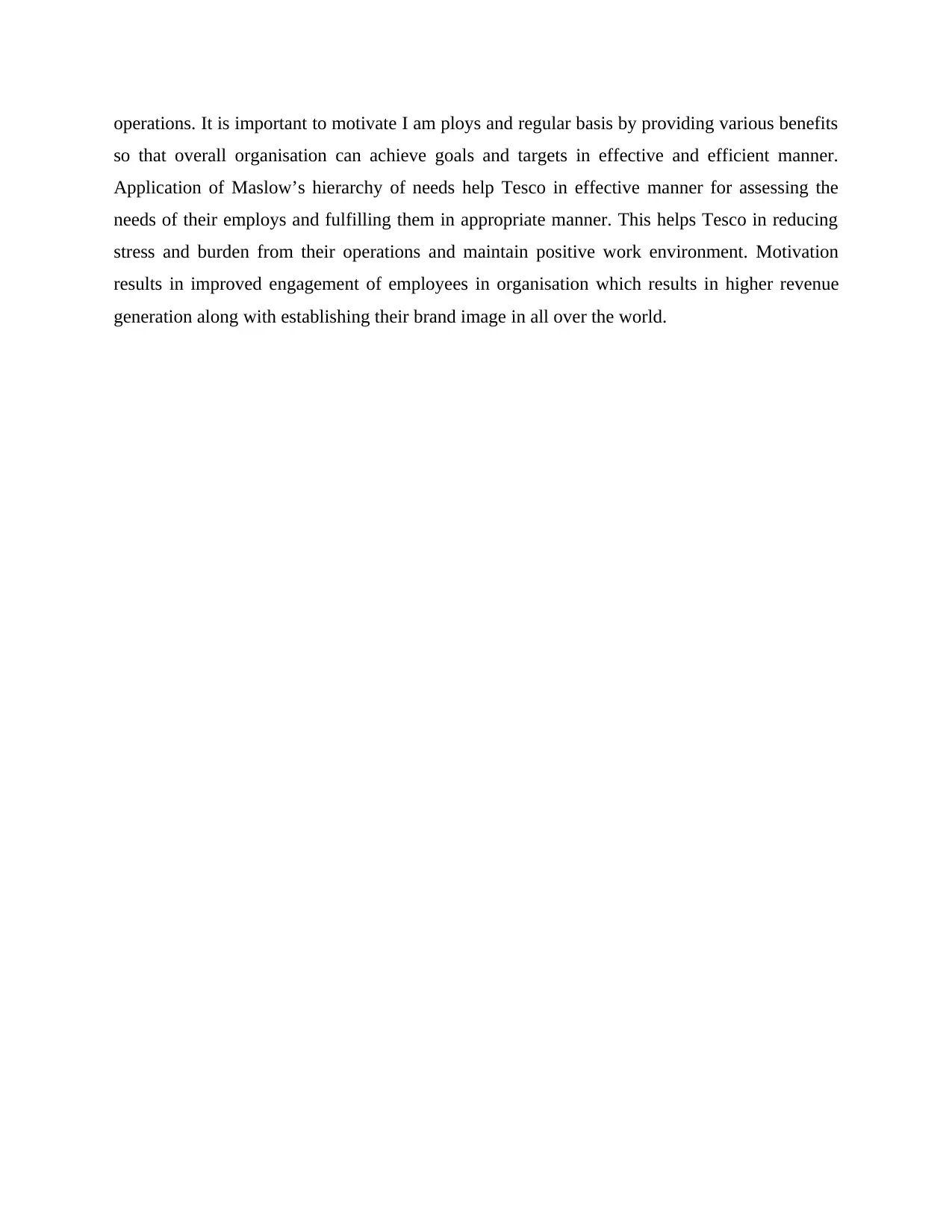
operations. It is important to motivate I am ploys and regular basis by providing various benefits
so that overall organisation can achieve goals and targets in effective and efficient manner.
Application of Maslow’s hierarchy of needs help Tesco in effective manner for assessing the
needs of their employs and fulfilling them in appropriate manner. This helps Tesco in reducing
stress and burden from their operations and maintain positive work environment. Motivation
results in improved engagement of employees in organisation which results in higher revenue
generation along with establishing their brand image in all over the world.
so that overall organisation can achieve goals and targets in effective and efficient manner.
Application of Maslow’s hierarchy of needs help Tesco in effective manner for assessing the
needs of their employs and fulfilling them in appropriate manner. This helps Tesco in reducing
stress and burden from their operations and maintain positive work environment. Motivation
results in improved engagement of employees in organisation which results in higher revenue
generation along with establishing their brand image in all over the world.
⊘ This is a preview!⊘
Do you want full access?
Subscribe today to unlock all pages.

Trusted by 1+ million students worldwide
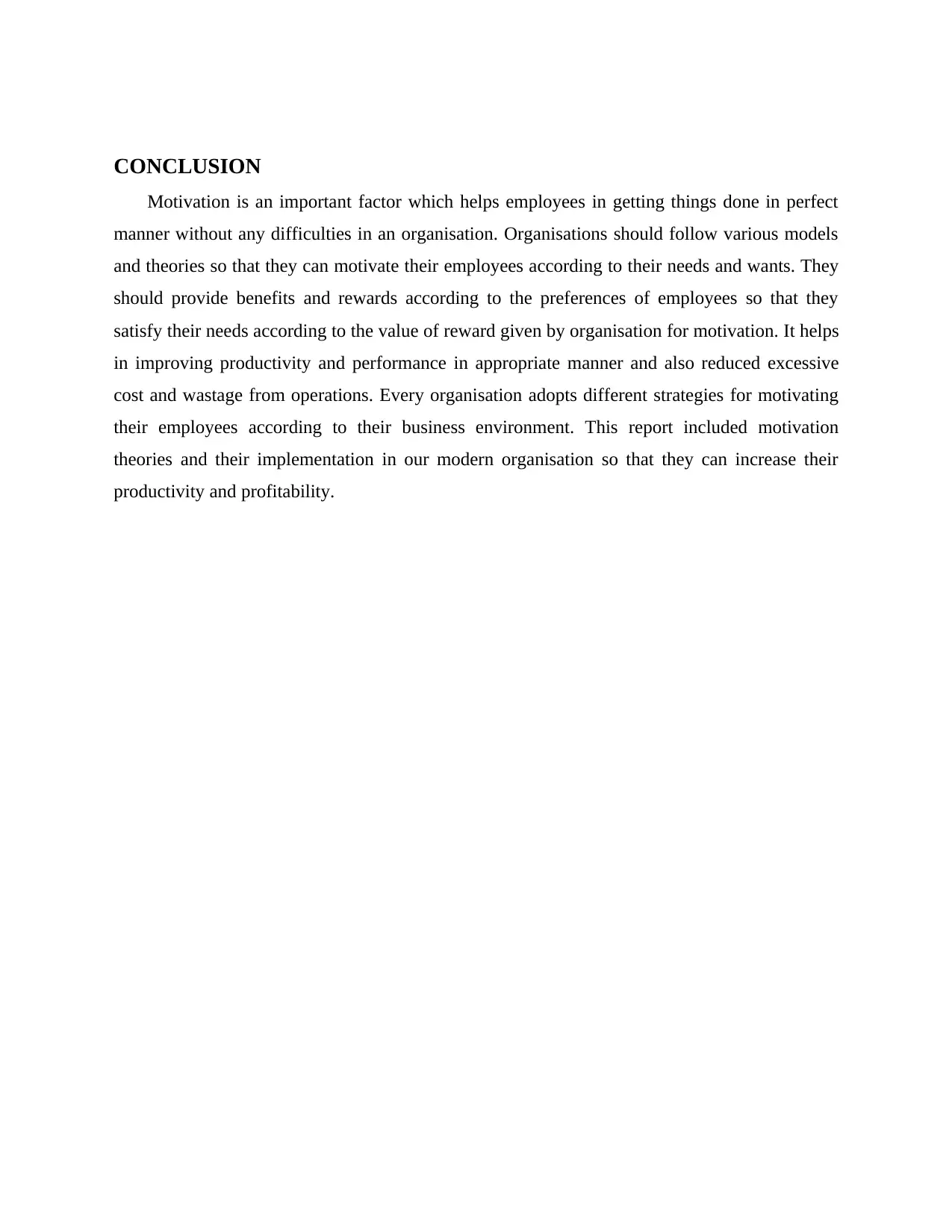
CONCLUSION
Motivation is an important factor which helps employees in getting things done in perfect
manner without any difficulties in an organisation. Organisations should follow various models
and theories so that they can motivate their employees according to their needs and wants. They
should provide benefits and rewards according to the preferences of employees so that they
satisfy their needs according to the value of reward given by organisation for motivation. It helps
in improving productivity and performance in appropriate manner and also reduced excessive
cost and wastage from operations. Every organisation adopts different strategies for motivating
their employees according to their business environment. This report included motivation
theories and their implementation in our modern organisation so that they can increase their
productivity and profitability.
Motivation is an important factor which helps employees in getting things done in perfect
manner without any difficulties in an organisation. Organisations should follow various models
and theories so that they can motivate their employees according to their needs and wants. They
should provide benefits and rewards according to the preferences of employees so that they
satisfy their needs according to the value of reward given by organisation for motivation. It helps
in improving productivity and performance in appropriate manner and also reduced excessive
cost and wastage from operations. Every organisation adopts different strategies for motivating
their employees according to their business environment. This report included motivation
theories and their implementation in our modern organisation so that they can increase their
productivity and profitability.
Paraphrase This Document
Need a fresh take? Get an instant paraphrase of this document with our AI Paraphraser
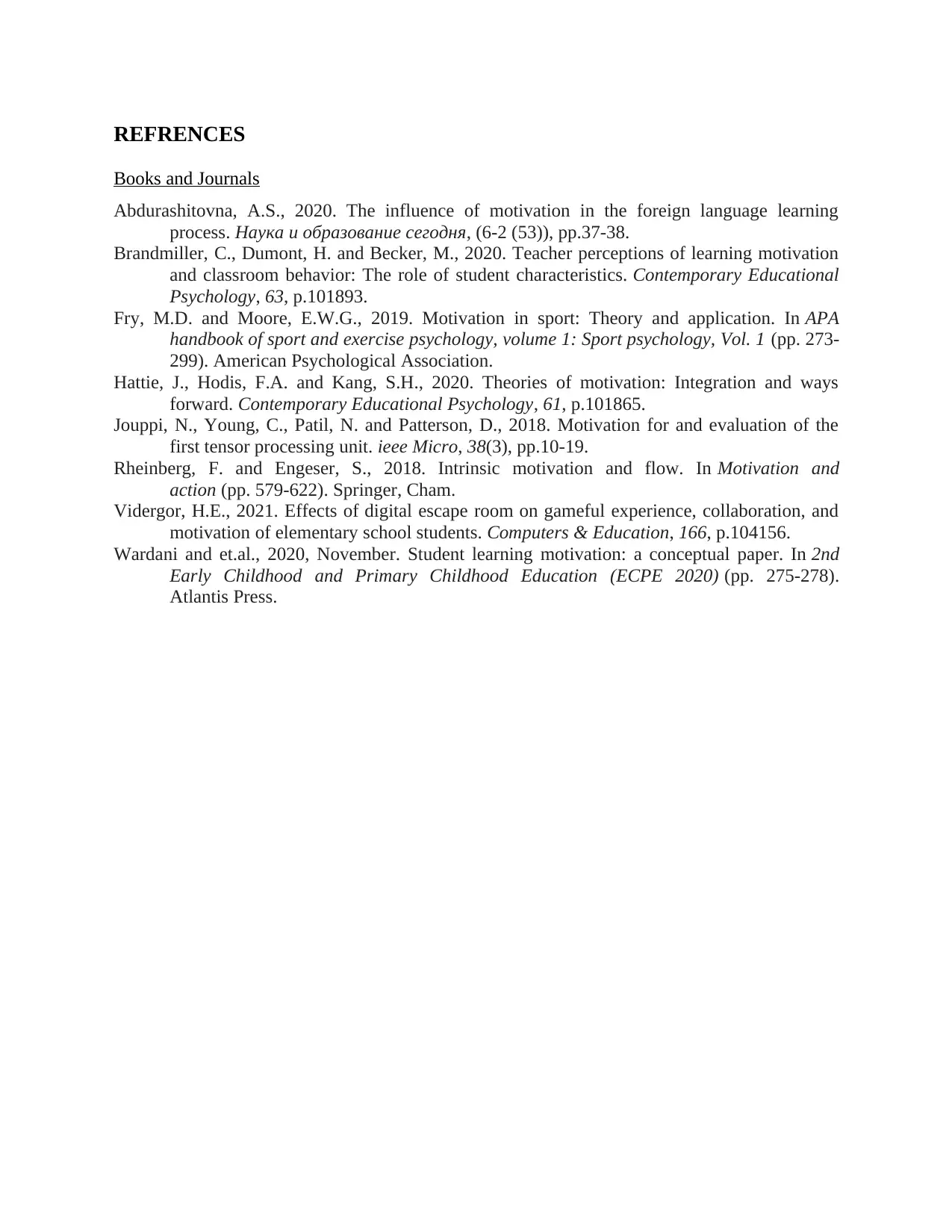
REFRENCES
Books and Journals
Abdurashitovna, A.S., 2020. The influence of motivation in the foreign language learning
process. Наука и образование сегодня, (6-2 (53)), pp.37-38.
Brandmiller, C., Dumont, H. and Becker, M., 2020. Teacher perceptions of learning motivation
and classroom behavior: The role of student characteristics. Contemporary Educational
Psychology, 63, p.101893.
Fry, M.D. and Moore, E.W.G., 2019. Motivation in sport: Theory and application. In APA
handbook of sport and exercise psychology, volume 1: Sport psychology, Vol. 1 (pp. 273-
299). American Psychological Association.
Hattie, J., Hodis, F.A. and Kang, S.H., 2020. Theories of motivation: Integration and ways
forward. Contemporary Educational Psychology, 61, p.101865.
Jouppi, N., Young, C., Patil, N. and Patterson, D., 2018. Motivation for and evaluation of the
first tensor processing unit. ieee Micro, 38(3), pp.10-19.
Rheinberg, F. and Engeser, S., 2018. Intrinsic motivation and flow. In Motivation and
action (pp. 579-622). Springer, Cham.
Vidergor, H.E., 2021. Effects of digital escape room on gameful experience, collaboration, and
motivation of elementary school students. Computers & Education, 166, p.104156.
Wardani and et.al., 2020, November. Student learning motivation: a conceptual paper. In 2nd
Early Childhood and Primary Childhood Education (ECPE 2020) (pp. 275-278).
Atlantis Press.
Books and Journals
Abdurashitovna, A.S., 2020. The influence of motivation in the foreign language learning
process. Наука и образование сегодня, (6-2 (53)), pp.37-38.
Brandmiller, C., Dumont, H. and Becker, M., 2020. Teacher perceptions of learning motivation
and classroom behavior: The role of student characteristics. Contemporary Educational
Psychology, 63, p.101893.
Fry, M.D. and Moore, E.W.G., 2019. Motivation in sport: Theory and application. In APA
handbook of sport and exercise psychology, volume 1: Sport psychology, Vol. 1 (pp. 273-
299). American Psychological Association.
Hattie, J., Hodis, F.A. and Kang, S.H., 2020. Theories of motivation: Integration and ways
forward. Contemporary Educational Psychology, 61, p.101865.
Jouppi, N., Young, C., Patil, N. and Patterson, D., 2018. Motivation for and evaluation of the
first tensor processing unit. ieee Micro, 38(3), pp.10-19.
Rheinberg, F. and Engeser, S., 2018. Intrinsic motivation and flow. In Motivation and
action (pp. 579-622). Springer, Cham.
Vidergor, H.E., 2021. Effects of digital escape room on gameful experience, collaboration, and
motivation of elementary school students. Computers & Education, 166, p.104156.
Wardani and et.al., 2020, November. Student learning motivation: a conceptual paper. In 2nd
Early Childhood and Primary Childhood Education (ECPE 2020) (pp. 275-278).
Atlantis Press.
1 out of 8
Related Documents
Your All-in-One AI-Powered Toolkit for Academic Success.
+13062052269
info@desklib.com
Available 24*7 on WhatsApp / Email
![[object Object]](/_next/static/media/star-bottom.7253800d.svg)
Unlock your academic potential
Copyright © 2020–2026 A2Z Services. All Rights Reserved. Developed and managed by ZUCOL.



